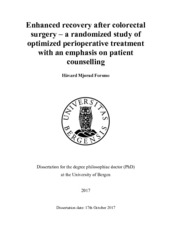Enhanced recovery after colorectal surgery – a randomized study of optimized perioperative treatment with an emphasis on patient counselling
Doctoral thesis
Permanent lenke
https://hdl.handle.net/1956/17112Utgivelsesdato
2017-10-17Metadata
Vis full innførselSamlinger
Sammendrag
Background: Enhanced recovery after surgery (ERAS) is a perioperative multimodal approach with purpose to reduce surgical stress response and organ dysfunction, and thus to decrease the perioperative morbidity and length of hospital stay (LOHS). Randomized trials have shown that patients recover faster when traditions are altered, including extended information and guidance to patients, changes in analgesia and anaesthetic procedures, mobilisation procedures, and concerted effort by the department to reduce hospital stay. Although the benefits of ERAS on LOHS are recognized, the main causes for this reduction are not well understood. Objectives of PhD-work/research questions: 1. We endeavoured to perform a controlled, randomized trial in which we compared patients treated by an ERAS approach with a special focus on counselling and guidance to patients treated in a standard traditional care pathway. The main objective of this study was to find whether we were able to decrease the total hospital stay (THS), primarily as a result of reduced morbidity (paper I). 2. A large part of patients with colorectal resections also need stoma. We wanted to examine whether pre- and postoperative stoma education within an ERAS programme can reduce the length of hospital stay, stoma-related complications, readmissions and improve health-related quality of life (HRQoL) (PaperII). 3. Evaluate patients in various age groups in the ERAS care pathway, and examine whether elderly patients adhered to an ERAS program and achieved the same outcomes as younger patients (paper III). 4. Assess additional insights into the impact of perioperative counselling and guidance when groups of patients are otherwise the same with respect to ERAS criteria (paper IV). Results: Paper I showed that THS was significantly shorter in patients randomized to the ERAS care group than in patients randomized to the standard care group, although the two treatment groups had similar outcomes regarding 30-day mortality, major and minor morbidity, rate of reoperation, and readmissions. There were also no differences in postoperative C-reactive protein (CRP) levels, reflecting the inflammatory response, or the patients` tolerance of enteral nutrition. From this first study we cannot determine that one ERAS element is more effective than other interventions, but it suggests that accurate pre- and postoperative information and continuous guidance are important for the reduction in hospital stay. Paper II also showed a significantly shorter THS in the ERAS group with stoma education than in the standard care group. Regarding major and minor complications, stoma-related complications, re-admission rate, 30-day mortality and HRQoL, the two treatment groups had similar outcomes. Paper III investigated whether elderly patients may comply with the implementation of this multidisciplinary program, and whether they have better or worse outcome in an ERAS program than younger patients. This sub analysis showed that the adherence to the ERAS protocol was equally good in elderly and in younger patients. There were also no significant differences in THS in the different age groups treated in an ERAS program. Paper IV described a new randomized trial where we compared ERAS care plus extended counselling to ERAS care with standard counselling. The main result was that THS can be significantly reduced with extended pre- and postoperative counselling and guidance as an independent strategy. Conclusion: ERAS reduces the length of hospital stay in younger and older patients, as well as in patients receiving a planned stoma. The main reason for this reduction is due to extended pre- and postoperative patient information, education and guidance.
Består av
Paper I: Forsmo HM, Pfeffer F, Rasdal A, Østgaard G, Mohn AC, Körner H, Erichsen C. Compliance with enhanced recovery after surgery criteria and preoperative and postoperative counselling reduces length of hospital stay in colorectal surgery: results of a randomized controlled trial. Colorectal Dis. 2016 Jun;18(6):603-11. The article is available in the main thesis. The article is also available at: http://dx.doi.org/10.1111/codi.13253Paper II: Forsmo HM, Pfeffer F, Rasdal A, Sintonen H, Körner H, Erichsen C. Pre- and postoperative stoma education and guidance within an enhanced recovery after surgery (ERAS) programme reduces length of hospital stay in colorectal surgery. Int J Surg. 2016 Oct 22;36(Pt A):121-126. The article is also available at: https://doi.org/10.1016/j.ijsu.2016.10.031
Paper III: Forsmo HM, Erichsen C, Rasdal A, Körner H, Pfeffer F. Enhanced recovery after colorectal surgery (ERAS) in elderly patients is feasible and achieves similar results as in younger patients. Gerontology & geriatric medicine 2017, 3:2333721417706299. The article is available at: http://hdl.handle.net/1956/17111
Paper IV: Forsmo HM, Erichsen C, Rasdal A, Tvinnereim JM, Körner H, Pfeffer F. Randomized controlled trial of extended counselling in enhanced recovery after colorectal surgery. Diseases of the Colon and Rectum. 2018 Jun;61:724-732. The article is available at: http://hdl.handle.net/1956/17701
